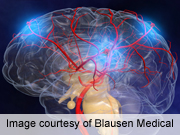
FRIDAY, Jan. 3, 2014 (HealthDay News) — People who’ve had shingles — a viral infection also known as herpes zoster — before age 40 may have a higher risk of stroke years later, a large new study suggests.
Adults who get shingles after 40 don’t have an increased risk of stroke. But along with those who had shingles before 40, they do have a higher risk of heart attack and “transient ischemic attack” (TIA), sometimes called a mini-stroke, the study authors said.
“In those aged less than 40 years at the time of herpes zoster, the risk of stroke, TIA and [heart attack] occurring in the years following was significantly higher than in [people without the infection],” said Dr. Judith Breuer, study lead author and a professor of virology and head of infection and immunity at University College London, in England.
“Herpes zoster is also more common in individuals who have risk factors for vascular disease, including diabetes and [high blood pressure],” Breuer said.
While the study found a link between shingles and higher stroke risk in younger adults, it didn’t prove a cause-and-effect relationship.
Results of the study appeared online Jan. 2 in advance of publication in the Jan. 21 print issue of the journal Neurology.
Shingles is caused by the same virus that causes chickenpox. After someone has chickenpox, the virus stays in the body, lying dormant in the nerve roots, often for decades. It’s not clear exactly why, but in some people, the virus reactivates and causes shingles, according to the U.S. Centers for Disease Control and Prevention.
People who have compromised immune systems are more likely to have shingles, according to the CDC. This includes people who have HIV and certain cancers, and people taking medications that suppress the immune system, such as those who’ve had an organ transplant.
Shingles causes a painful rash, usually on one side of the body. Pain, itching and tingling may occur before the rash appears.
Stroke risk is increased during a bout of shingles, according to background information in the study. But, Breuer and her colleagues wondered if the increased stroke risk lasted much longer than the shingles.
To answer that question, they reviewed more than 106,000 cases of shingles in the United Kingdom and compared them to more than 213,000 people who were matched for age and sex but hadn’t had shingles. For those who’d had shingles, the average time since their illness was a little over six years. The longest time since shingles was 24 years.
The researchers controlled their analysis to account for other factors that could increase stroke and heart attack risk, such as smoking history, high blood pressure, unhealthy cholesterol levels, diabetes, heart problems and obesity.
In people who’d had shingles when they were over 40, the risk of stroke was not increased, the investigators found. However, the risks of heart attack and mini-strokes were slightly higher.
For those who had shingles before age 40, however, risk of stroke was 74 percent higher compared to those who hadn’t had shingles. Their risk of mini-stroke was 2.4 times higher and their risk of heart attack was increased by 50 percent, the study revealed.
Breuer said the reason that having had shingles might increase a person’s risk of stroke, mini-stroke or heart attack is that shingles can also cause an inflammation of certain blood vessels. In people who already have risk factors for stroke or heart attack, this inflammation would add to that risk, she explained.
However, two U.S. doctors suggested that stroke risk posed by shingles might be overstated.
“The risk may be higher in people under 40 because of all the confounding factors they looked at,” said Dr. Kenneth Bromberg, director of the Vaccine Research Center at the Brooklyn Hospital Center in New York City. “Maybe more attention is paid to factors like diabetes and [high blood pressure] in people over 40. Maybe if you deal with the risk factors, the zoster might be less of an issue.”
Added Dr. Len Horovitz, an internal medicine physician at Lenox Hill Hospital in New York City: “Clearly, this study found an association between stroke and shingles in people under 40, but it’s unclear what the exact mechanism is.
“This study raises more questions than it answers,” Horovitz said. “Would these findings be the same in the U.S.? These researchers looked at a British population. Do we need to be more vigilant about screening people who’ve had early shingles? Is it really a risk factor for stroke? Would the vaccine have any effect?”
Study author Breuer said it’s unclear what effect the shingles vaccine might have on the increased risk of stroke.
In the meantime, all three experts advised that anyone who’s had shingles before age 40 be screened for stroke and heart attack risk factors, such as diabetes, high blood pressure and unhealthy cholesterol levels.
More information
Learn more about shingles and the shingles vaccine from the U.S. Centers for Disease Control and Prevention.
Copyright © 2026 HealthDay. All rights reserved.

